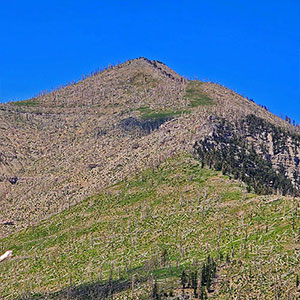Fletcher Canyon Trailhead / Harris Mt Griffith Peak Circuit | Mt Charleston Wilderness, Nevada
Overview – Fletcher Canyon Trailhead / Harris Mt Griffith Peak Circuit | Mt Charleston Wilderness, Nevada
24-Hour Wilderness Immersion
From wild mountain ridges to a nearly untouched summit to rediscovery of an old overgrown back-wilderness trail, to one of the most popular summits and trails in the Mt. Charleston Wilderness: This adventure has it all in a 12-hour total immersion in the wilderness.
Spectacular Views the Entire Way
The start/end point is one of the most convenient, popular trailheads in the Mt. Charleston Wilderness: Fletcher Canyon Trailhead. The wild ridge ascent to Harris Mountain summit presents spectacular views of all the highest peaks in the Mt. Charleston Wilderness and is like being on a mountaintop all the way to Harris Mountain Summit! Spectacular views to this point include: Fletcher Peak, Mummy Mountain, Lee Peak, Charleston Peak, Griffith Peak, Angel Peak, the Sheep Range, Gass Peak, the La Madre Mountains, the Rainbow Mountains and Potosi Mountain. Also included are the full length of Kyle Canyon and Lovell Canyon along with glimpses of the Las Vegas Valley.
Rediscovery of a Faint Back-Wilderness Trail
Then, descend from Griffith Peak to the Harris/Griffith saddle and locate the faint, overgrown Griffith Peak back-wilderness trail that began at the summit of Harris Mountain Road. We’ll trace this trail all the way to Griffith Peak summit. On Griffith Peak summit you can add Pahrump, the Armargosa Valley, the faint outline of Telescope Peak in the Panamint Range on the West side of Death Valley, California, a spectacular view of the Las Vegas Strip and too many additional reference points to mention here.
Completing the Loop
Finally, descend Griffith Peak to the Charleston South Loop Trailhead at Cathedral Rock on one of the most popular trails in the Mt. Charleston Wilderness. From the trailhead at Cathedral Rock, take Kyle Canyon Road back to the starting point at the Fletcher Canyon Trailhead.
Best Time of Year for This Adventure
The best time of year for this adventure is during the Summer months, July and August are best. You need a lot of daylight, a snow-free route and a comfortable temperature range. On this 3rd week of July, during a heat wave in the Las Vegas Valley bringing temperatures between 114 and 119, I was in a comfortable 70-75 degrees the entire day. In fact, when a few clouds formed and it became windy, it was, for just a brief moment, almost uncomfortably cold!
Safety Factors
- Wilderness Navigation Experience: It was important that I had a lot of wilderness navigation experience in the region, along with familiarity of all the surrounding peaks to use as reference points throughout.
- Visibility: It was a clear day with perfect visibility. Had visibility been blocked by clouds, this would have added a huge challenge factor, possibly including some danger. I completed the entire loop in daylight. Traversing wilderness areas in the dark brings challenges I do not seek out, but have managed.
- Route Familiarity: I had previously traversed every portion of this route, just not the entire loop all at once, so I was familiar with the route. You might want to do the same and build up to the total loop.
- Equipped for High Temperatures: With 114-119 degrees predicted in Las Vegas, I started out with 8 liters of liquid (mostly water). I ended the day with a half liter. The water was heavy in the beginning and slowed the ascent up the massive Western approach ridge. It was annoying at times. But compare this to the life-threatening situation of running out of water! Game over!
- Base Conditioning: Another advantage was my daily conditioning runs of 5 off-road miles four days each week along with one day-long 15+-mile wilderness adventure. You need a good solid base conditioning for an adventure like this. And, those off-road runs and weekly wilderness adventures strengthen the ankles. Imagine spraining a weak ankle way out in the wilderness! Finally, I had worked my way up to 11,000ft altitude conditioning previously.
The sum total of all this is that when you’re not straining beyond your limits, you’re less likely to have injury or exhaustion or dehydration issues along the way, and more likely to be enjoying the adventure!
Route Starting Point Directions – Fletcher Canyon Trailhead / Harris Mt Griffith Peak Circuit | Mt Charleston Wilderness, Nevada
Begin at The Fletcher Canyon Trailhead. Driving to the Fletcher Canyon Trailhead is pretty easy: Up I-95 North from Las Vegas, take a left at the Kyle Canyon exit, continue about 20 miles up Kyle Canyon Road, pass the traffic circle at The Spring Mountains Visitor Gateway, pass the Deer Creek Road turnoff and Mt Charleston Lodge and then onward for less than a quarter mile to The Fletcher Canyon Trailhead parking on your left. In all, it’s less than 40 miles from the Las Vegas Strip.
Route Observations – Fletcher Canyon Trailhead / Harris Mt Griffith Peak Circuit | Mt Charleston Wilderness, Nevada
The Harris Mountain Triangle
We begin by setting the stage for this adventure. Harris Mountain summit, two massive approach ridges and Kyle Canyon Road form a huge triangle. Harris Mountain summit is the apex (high point) of the triangle. Kyle Canyon Road forms the base of the triangle with the Fletcher Canyon Trailhead at its center. Finally the two sides of the triangle leading up to Harris Mountain Summit are formed by two massive ridges: An Eastern ridge, East of the Fletcher Canyon Trailhead and a Western ridge, West of the Fletcher Canyon Trailhead. We take the Western approach ridge to Harris Mountain summit.
From the Trailhead to Forest Road 579
Begin this adventure by crossing the bridge behind the Fletcher Canyon Trailhead restroom and turning right on The Acastus Trail, which runs parallel to Kyle Canyon Road. Keep your sites on the huge Western approach ridge which is your first goal. You’re going to head up The Acastus Trail, circle the base of the Western approach ridge and then ascend the far side to arrive at the center of the ridge.
As you begin heading up the Acastus Trail, named for a rare butterfly found only here in the Spring Mountains and nowhere else on earth, you’ll pass a forest service complex on your left. At the upper end of that complex lies the gated entrance to the unpaved forest maintenance road 579 (unmarked, but it’s the only road to your left. There is an open passage through the gate. The road begins to rapidly ascend as it approaches, then circles around the base of the Western approach ridge (possibly named Rainbow Ridge).
Rainbow Ridge Road to the Western Approach Ridge Ascent Point
As maintenance road 579 reaches the far side of the base of the Western approach ridge, it meets up with Rainbow Ridge Road. Take a left onto Rainbow Ridge Road, which will skirt with West base of the Western approach ridge as it continues to ascend. Your goal is to stay on the road as long as possible before it takes a turn away from the ridge at a large yellow diamond “Dip” sign. The reason you want to stay on the road as long as possible is that roads and trails are about 3 times as easy and rapid as traversing wilderness.
Entering the Wilderness and Ascending The Western Approach Ridge
At the “Dip” sign, leave Rainbow Ridge Road and begin ascending the Western Approach Ridge. I headed upward in a diagonal direction in order to mitigate the steep incline of the ridge and land on the ridge center further up the ridge. Still, the incline is steep, every step a 12-18 inch rise. I liken it to ascending the Empire State Building twice taking 3 steps at a time on a loose rock surface.
Challenges While Ascending The Western Approach Ridge
Fortunately, the terrain is relatively open and it’s possible to land every step on relatively firm ground as you fairly easily weave between rocks, plants, burned trees, burned Mountain Mahogany groves and fallen logs. My goal is always to avoid disturbing the wilderness by not stepping on anything living, treading lightly and leaving no trace. The entire ridge and much of the route to Harris Mountain summit and from there to Griffith Peak summit is recovering burn area from the 2013 Carpenter Fire. Incidentally, for your own safety, do not put your full weight on any boulder or fallen log. Such objects may be unstable. Fallen logs with both ends well anchored are safe. There are standing burned trees, which at some time will fall, most likely when the ground is wet. Just beware through this wilderness trek. Observing these pre-cautions, I’ve never experienced a boulder being dislodged or a log rolling during all my wilderness adventures.
Navigating the Ridgetop
What a shocker when you finally reach the center of the Western approach ridge! From there you can see far up and down Kyle Canyon, and all the high mountain peaks are visible. The views keep getting better all day! And, after that initial ridge ascent, the incline decreases considerably. Great views, easier traverse!
Still, the ridgetop has its moments with some briefer, sharp inclines, rocky ledges and other obstacles. But you can pretty easily weave around these as you continue to ascend. Stay on the upper West edge of the ridge. The East edge is more vertical.
Two Grassy Hills Below Harris Mountain Summit
Eventually, you’ll ascend to a stretch involving 2 grassy hills, littered with fallen logs. Before the fire these must have been beautiful Ponderosa and Bristlecone Pine forests. Now the burned hulks of tree trunks have fallen. It’s still fairly easy to weave around the logs. It’s more open to the left. There are a few places where you will need to step on and over 2-3 levels of fallen logs. Just take the precautions mentioned earlier. The views from these wide open grassy hills are incredible and you may feel as if you were in an alpine scene from the movie, The Sound of Music.
Bristlecone Pine Forest to Harris Mountain Summit
At the summit of the second grassy hill you emerge into a beautiful, unburned bristlecone pine forest. Weave upward another 200ft ascent through this forest to arrive on Harris Mountain summit! The summit is wild and literally buzzing with insect life including rare butterflies and swarms of migrating ladybugs. June is the height of this insect life on Harris Mountain summit. However, even in July through the first snows of the Fall season, there are abundant Spring blooms on Harris Mountain Summit. Due to the remoteness of the main Harris Mountain Trailhead, tucked away miles up the 4WD Harris Mountain Road, few people visit Harris Mountain summit. So, unlike some of the other trampled summits in the Mt. Charleston Wilderness, Harris Mountain summit is wild, untrampled and pristine.
Descent to the Harris/Griffith Saddle
Now, on Harris Mountain Summit, set your sites on Griffith Peak to the West. Heading straight toward Griffith Peak, you’re going to descend to the base of the saddle between the two mountains. There is no trail from Harris Mountain summit down to the saddle, so again, as before, weave around the now familiar obstacles. There are a couple grassy plateaus on the way down. Be careful to keep your sites on Griffith Peak and stay on the ridge. If you enter the ponderosa pine forest to the right, it’s easy to get off-course and find yourself descending off the ridge and down into Kyle Canyon! All that aside, the route down to the base of the saddle is fairly easy.
Connecting with the Griffith Peak Back-Wilderness Trail
As you near the base of the saddle angle toward the left side of the ridge in order to meet up with the faint Griffith Peak back wilderness trail. This trail will take you all the way to Griffith Peak summit, but you’ll need to be quite a wilderness detective to pick out the trail through overgrown grass, brush and fallen logs. In the video on this page I did just that. Why try to stick to the trail? It will easily guide you up through those imposing cliffs you saw on the far side of the saddle as you were descending Harris Mountain. In addition, the trail will take you in a fairly gradual incline around a number of vertical rocky obstacles as you ascend the approach ridge toward Griffith Peak. When you reach fallen logs totally blocking the trail in a few instances, circumvent the log jams, then pick up the trail again on the opposite side of the log jam immediately across from the spot where you left the trail. The first couple times I navigated this ridge, I did not know of the trail. I can attest to the huge time savings the trail gives you when compared to scaling steep slopes and some class 3 rocky ledges. No climbing is needed on the trail and progress is much more rapid.
Two Final Grassy Hills Below Griffith Peak Summit
As you circumvent the last rocky section on the ridge there are two long, steep grassy slopes between you and Griffith Peak summit. At the base of these hills, turn toward Las Vegas for an incredible view of the Strip! The trail seemed to disappear at the base of these final slopes, but it was easy to chart a switchback course, weaving upward around thick clumps of grass to Griffith Peak summit.
Arrival on Griffith Peak Summit
There’s a very distinctive summit box on a standing pole at Griffith Peak summit. Stop there, enjoy the view, all points mentioned above. Congratulate yourself on this 2-summit achievement, and enjoy the thought that it’s downhill all the way back to your starting point at the Fletcher Canyon Trailhead!
Locating and Descending The Griffith Peak and Charleston South Loop Trails
Beyond the summit box, the most distinct trail you have seen all day appears and descends down the opposite side of Griffith Peak summit. To reassure yourself you’re on track, you should be looking straight at Charleston Peak as you descend from Griffith Peak summit. This main Griffith Peak Trail descends to the junction of the Charleston South Loop Trail where there is a camping spot for backpackers on their way to and from Charleston Peak. Take a right at the junction to continue your descent to the South Loop Trailhead at the base of Cathedral Rock. There are three spectacular viewpoints on the way down to the trailhead. While standing on the edge of those viewpoints you can see straight down into Charleston Village and the across, up and down Kyle Canyon.
A Snowball’s Chance in Hell!
On this day, the lowest viewpoint offered a spectacular view of a long snowfield up the length of a gully toward Griffith Peak. As the snow was melting near the end of July (there’s never been snow this late!), there were some beautiful waterfalls scattered in that gully. The trail ultimately crosses the base of the gully where I found myself walking and slipping on snow just 40 miles from 119-degree Las Vegas and only 60-80 miles from the hell of nearly 130 degrees in Death Valley. On this snowfield, we finally, conclusively disprove the saying, “A snowball’s chance in Hell.” There was the snow, so close to Hell!
Return to Fletcher Canyon Trailhead
The remainder of the descent is pretty straightforward. Within about a mile and a half from the snowfield, you’re at the Cathedral Rock Trailhead and the upper end of Kyle Canyon Road. Descend Kyle Canyon Road back down to your start point at the Fletcher Canyon Trailhead. Huge loop and day-long incredible wilderness immersion including two spectacular peaks! This is an unforgettable life experience!



